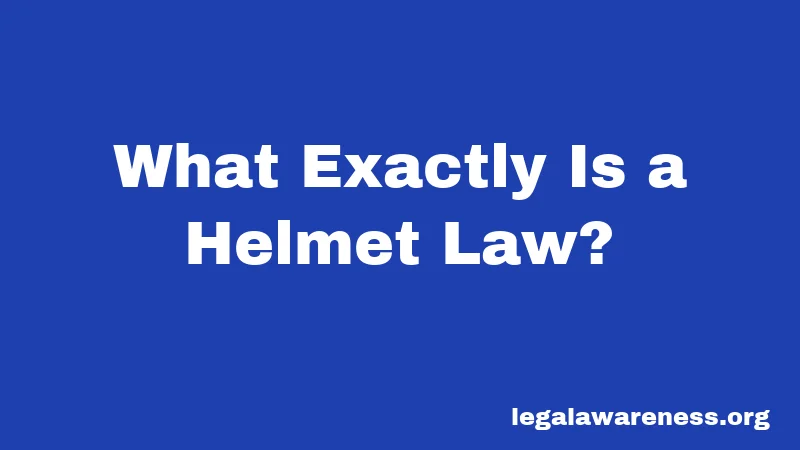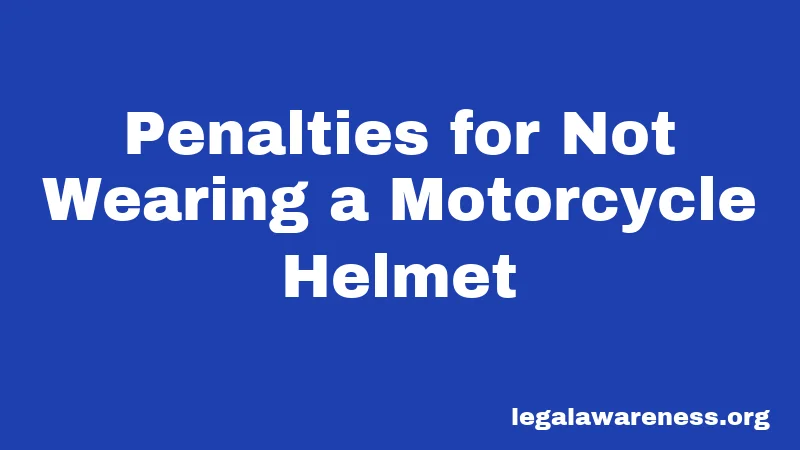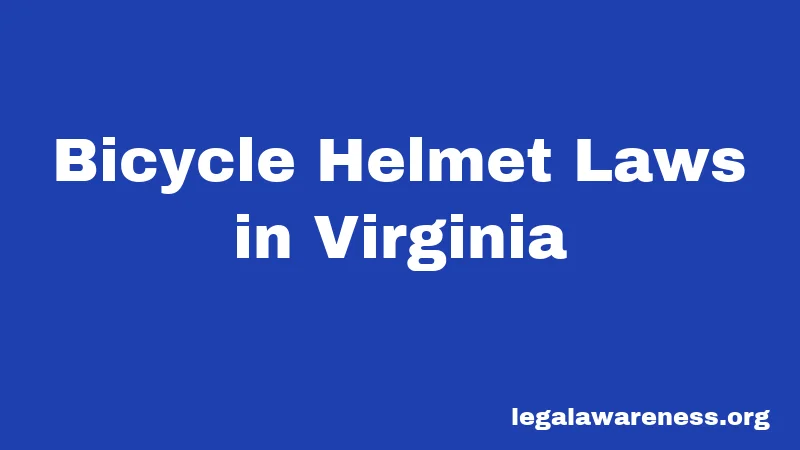Virginia Helmet Laws (2026): What Riders Really Need to Know
Most people have no idea how strict Virginia’s helmet laws actually are. Seriously. And if you get caught breaking them, the consequences can surprise you fast. Let’s break down exactly what you need to know before you ride.
Whether you’re on a motorcycle, bicycle, or electric bike, Virginia has specific rules about helmets. Some are mandatory. Some depend on where you live. Some come with serious fines. Keep reading to find out which ones apply to you.
What Exactly Is a Helmet Law?

A helmet law is pretty straightforward. It’s a rule that says you must wear protective headgear while riding certain vehicles. The whole point is safety. Helmets can literally save your life if you crash. Studies show they reduce the risk of dying in a motorcycle accident by 37 percent. They prevent traumatic brain injuries about 67 percent of the time.
Think of it like a seatbelt law, but specifically for your head. Virginia takes this seriously, and so should you.
Motorcycle and Autocycle Helmet Laws in Virginia
Here’s where it gets important. If you ride a motorcycle or autocycle in Virginia, you must wear a helmet. This applies to both the person driving the bike and any passengers. No exceptions based on age. No “just going around the block” passes. No exceptions for experienced riders.
You also need eye protection. This means either a face shield, safety glasses, or goggles. Unless your motorcycle has a safety windshield or safety glass already built in, you’re required to have one of those three things. The law is clear on this.
What Kind of Helmet Do You Actually Need?
Not every helmet counts. Virginia is picky about which helmets are legal. Your helmet must meet the standards set by one of these organizations:
The Snell Memorial Foundation. The American National Standards Institute (ANSI). The U.S. Department of Transportation (DOT).
You can usually spot a legal helmet by checking inside. Look for a sticker or label showing DOT, ANSI, or Snell certification. If you don’t see one, it’s probably not legal in Virginia. Also check the back of the helmet. DOT helmets have a sticker on the outside too.
Novelty Helmets Are Actually Illegal
Okay, here’s something that surprises people. Those cool-looking novelty helmets you see online? The ones that look like a shorty or half helmet but barely cover your head? They’re often illegal in Virginia. They’re also way less effective at protecting your brain.
Here’s the thing about novelty helmets. They look the part, but they don’t actually protect you. They’re designed for comfort and style, not safety. Some sellers even use fake certification labels. If you sell a novelty helmet in Virginia, you can be fined up to $250. Yes, just for selling them.
Wondering if you can tell the difference? Compliant helmets are heavier. They have thicker inner liners. The chin straps are sturdy. Novelty helmets? They’re light and flimsy by comparison.
Penalties for Not Wearing a Motorcycle Helmet

Let’s talk about what happens if you get pulled over without a helmet. This is where it gets serious.
First offense? You’re looking at a Class 4 Misdemeanor. That’s a fine up to $250. Not terrible, but it hurts. Your insurance company might use this against you too.
Get caught again and you’re looking at a Class 1 Misdemeanor. Now we’re talking $2,500 in fines. You could also spend up to 12 months in jail. Twelve months. In jail. For not wearing a helmet.
That’s a huge jump from the first fine, right? Virginia really wants people to wear helmets, and these penalties show it.
The Parade Exception (Yes, It Exists)
Wait, there’s actually one situation where motorcycle riders don’t have to wear helmets. It sounds random, but it’s the law.
If you’re riding in an organized parade that’s been approved by the Department of Transportation or local government, and law enforcement is there escorting the parade, you don’t need a helmet. But there’s a catch: the parade can only go 15 miles per hour or slower. So basically, a slow, official parade only.
No other exceptions exist. Not for short trips. Not for experienced riders. Not for anyone.
Bicycle Helmet Laws in Virginia

Here’s where things get different. Virginia does not have a statewide bicycle helmet law. You read that right. There’s no law saying all bicycle riders must wear helmets.
But wait, don’t skip your helmet just yet. Many Virginia cities and towns have passed their own local helmet laws. At least 29 communities in Virginia have adopted these rules. Your city or county might be one of them.
Local Bicycle Helmet Rules
If your locality has a helmet ordinance, the rule applies to children 14 and younger. Riders under 15 in those areas must wear a helmet. If they don’t, there’s a fine of $25.
Here’s the interesting part, though. If it’s your first time getting caught, the fine is often suspended. You might also avoid the fine if you buy a helmet right after being caught. Virginia wants kids to start the habit, not just pay money.
The helmet must meet safety standards too. Look for certification from the Consumer Product Safety Commission (CPSC). This is the standard for bicycle helmets sold in the U.S. Most modern bike helmets have this certification.
Which Virginia Communities Require Bike Helmets?
Not sure if your area has a local helmet law? Here’s what you should do. Contact your local city or county government. Ask if they’ve passed a bicycle helmet ordinance. The Virginia Department of Transportation (VDOT) also keeps a list of communities with these laws. Check with them if you need the official list.
This is important if you have kids. You want to know whether they’re required to wear helmets in your area. Better to find out from a website than from a police officer.
Electric Bikes and E-Scooters
Got an electric bike (e-bike)? The rules depend on the class. Virginia has different classifications for electric bikes based on how fast they can go.
For Class 3 electric power-assisted bikes, riders must wear a helmet. These bikes can go faster, and Virginia treats them more like motorcycles. If you’re riding one, your helmet must meet CPSC standards.
Other classes of electric bikes might have different rules depending on your locality. This is another situation where contacting your local government helps. They can tell you exactly what applies in your area.
What Happens in a Personal Injury Case Without a Helmet?
Here’s something legal that affects riders. Virginia law says that not wearing a helmet cannot automatically make you negligent in a court case. That’s good news if you’re injured in an accident without one.
But here’s the catch. Even though the law protects you from automatic negligence, the other side can still argue that you were negligent. They can suggest you assumed the risk by riding without a helmet. An insurance company might use this to reduce what they pay you.
Virginia is a contributory negligence state. That means if you’re even 1 percent at fault, you might not recover anything. A skilled attorney makes a huge difference here, because the difference between “automatic negligence” and “you were negligent” matters a lot in court.
How to Make Sure Your Helmet Is Actually Safe
You bought a legal helmet. Great. Now make sure it actually fits and works properly.
A proper-fitting helmet sits level on your head. It should be about two finger-widths above your eyebrows. It needs to be snug but not uncomfortable. The chin strap should be snug too, so the helmet doesn’t slide around.
Check the manufacture date inside. Most helmets should be replaced every five years. After that, the protective foam starts to break down. If your helmet is more than five years old, get a new one. If you’ve had a crash, replace it immediately. A helmet has done its job if it protected you in a fall, but it won’t protect you the same way twice.
Can You Wear Any Approved Helmet From Another Country?
Good question. The answer is mostly no. Some helmets from Europe meet ECE standards (United Nations Economic Commission for Europe). But Virginia specifically requires DOT, ANSI, or Snell certification. An ECE helmet might not qualify, even if it’s technically safe.
Stick with helmets certified by one of the three standards Virginia accepts. It’s the safest choice and keeps you legal.
What Should You Do Right Now?
If you ride a motorcycle, check your helmet right now. Does it have a DOT, ANSI, or Snell sticker? If not, you’re riding illegally. Get a new one before your next ride.
If you ride a bicycle, check your local ordinances. Search your city or county website for helmet laws. If you have kids, make sure you know the rules. Better to know now than to pay a fine later.
If you’re not sure about your helmet, ask the person who sold it to you. A reputable bike shop or motorcycle gear store can confirm whether your helmet is legal in Virginia.
Penalties and Fines at a Glance
Here’s a quick summary of what you might face. For motorcycles, first offense is a $250 fine and Class 4 Misdemeanor. Second offense is up to $2,500 in fines and 12 months in jail. For bicycles (where local laws apply), violation is a $25 fine, though first-time violations are often suspended.
Honestly, these numbers seem pretty serious when you think about it. A $250 fine is not pocket change. And 12 months in jail for a second offense? That’s real time.
Why Virginia Takes Helmets So Seriously
The numbers explain it. The government looked at helmet data over a 15-year period. From 2002 to 2017, helmets saved more than 25,000 lives. In motorcycle accidents, helmet use reduces the overall risk of dying by 29 percent. Traumatic brain injuries drop by 67 percent.
When you look at those numbers, the strict laws make sense. Virginia is literally trying to keep people from dying or suffering life-altering injuries.
Special Situations and Questions
What if you have long hair? Your helmet still needs to fit properly. Long hair just goes inside or gets managed so the helmet still fits snugly.
What if you have a medical condition? Helmet laws don’t have medical exemptions in Virginia. If you have a condition that makes wearing a helmet impossible, talk to a lawyer about your specific situation.
What if you’re visiting Virginia from another state? Follow Virginia’s laws while you’re here. Even if your home state has different rules, Virginia’s rules apply on Virginia roads.
What about motorcycle trikes or three-wheeled motorcycles? The law applies to those too. Any three-wheeled motorcycle operator needs a helmet that meets standards.
Frequently Asked Questions
Do I have to wear a helmet on a private road or driveway in Virginia?
Virginia’s law applies to people “operating” motorcycles. That technically includes private property if the motorcycle is running. To be absolutely safe, wear a helmet anywhere you’re riding a motorcycle.
Can I modify my helmet to make it safer?
No. Don’t add things to your helmet or remove things from it. Once you modify it, it no longer meets the safety standards. Get a new helmet if the old one doesn’t fit right.
What if I’m in a motorcycle accident and wasn’t wearing a helmet?
You can still pursue a personal injury claim. The law says you can’t be automatically found negligent. But you should absolutely talk to an attorney. They can help navigate the complicated legal situation.
Do motorcycle passenger helmets have to be different from driver helmets?
No. Passengers and drivers need the same type of helmet. It must meet the same DOT, ANSI, or Snell standards.
Is a helmet law violation a criminal record?
A Class 4 Misdemeanor goes on your record. A Class 1 Misdemeanor definitely goes on your record. Both are criminal offenses. You might want to talk to a lawyer about your options if you get cited.
Final Thoughts
Virginia’s helmet laws exist for one reason: saving lives. When you look at the statistics, you see why Virginia takes this seriously. Helmets work. They prevent deaths. They prevent brain injuries. They change people’s lives.
Wearing a helmet isn’t about following a rule just to follow it. It’s about protecting yourself. Whether you ride a motorcycle or bicycle, make sure your helmet meets safety standards. Make sure it fits right. Replace it when it’s time.
If you’re unsure about your specific situation, reach out to your local police department or Virginia Department of Transportation. Ask questions. Get answers. Stay informed, stay safe, and enjoy the road.
References
Virginia Code § 46.2-910 – Motorcycle and Autocycle Helmet Requirements
Virginia Code § 46.2-906.1 – Local Bicycle Helmet Ordinances
Virginia Department of Transportation – Bicycle Safety
Virginia Department of Health – Bicycle and Skate Safety
National Highway Traffic Safety Administration – Helmet Effectiveness
